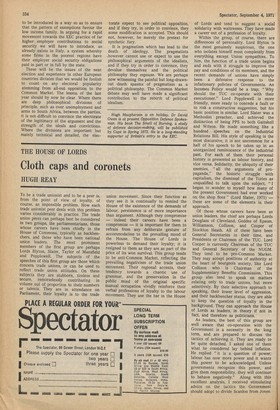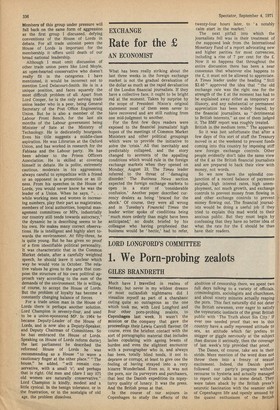Cloth caps and coronets
HUGH REAY
To be a trade unionist and to be a peer is, from the point of view of loyalty, of course, an impossible problem. How each trade unionist peer deals with this problem varies considerably in practice. The trade union peers can perhaps best be considered in two groups, the parliamentarians, those whose careers have been chiefly in the House of Commons, typically as backbenchers, and those who have been national union leaders. The most prominent members of the first group are perhaps Lords Blyton, Slater, Taylor of Mansfield and Popplewell. The subjects of the speeches of this first group are those which concern trade unions, or can be used to reflect trade union attitudes. On these subjects they are stubborn, tireless and secure, remorselessly contributing in volume out of proportion to their numbers or talents. They are in attendance on Parliament, their loyalty is to the trade union movement. Since their function as they see it is continually to remind the House of the existence of the demands of labour, persistence is of more importance than argument. Although they compromise — indeed their careers have been a compromise — it is important for them to refrain from any deliberate gesture of accommodation to the prevailing mood of the House. The House of Lords is powerless to demand their loyalty; it is resigned to them as they are as part of the price of its won survival. This group tends to be anti-Common Market, reflecting the prevailing negativism of the trade union movement. Their regional accents, their tendency towards a chaotic use of grammar, and the preservation in the public mind of the original specific manual occupation vividly reinforce their verbal professions of loyalty to the labour movement. They use the bar in the House of Lords and tend to suggest a social solidarity with waitresses. They have made a career out of a profession of loyalty.
Within the group, of course, there are differences of personality. Lord Blyton is the most genuinely suspicious, the one who isolates himself most completely from everything except Union sympathies. To him, the function of a trade union begins and ends with it struggle to improve the pay and conditions of its members, and the recent demands of unions have simply been a defensive response to the inflationary policies of Governments. An Incomes Policy would be a trap; "Why should the TUC co-operate with their executioner." Lord Popplewell is more friendly, more ready to concede a fault or to risk a constructive suggestion, but his basic position is similar. Lord Slater was a Methodist preacher, and achieved the distinction of being PPS to both Gaitskell and Wilson. He made something like a hundred speeches on the Industrial Relations Bill. His style of speaking is the most discursive; it is not uncommon for a half of his speech to be taken up in an unorganized reminiscence of the industrial past. For each of them their personal history is presented as labour history, and vice versa. Solidarity, the ubiquity of their enemies, "all the arguments of propaganda," the historic struggle with capitalism, the dismissal of the Tories as unqualified to talk upon the subject, "I began to wonder to myself how many of the present Government had ever worked on, the shop floor" (Lord Slater, 1971) — these are some of the elements in their approach.
Of those whose careers have been as union leaders, the chief are perhaps Lords Douglass of Cleveland, Geddes of Epsom, Williamson, Collison, and Cooper of Stockton Heath. All of these have been General Secretaries in their time, and Presidents or Chairmen of the TUC. Lord Cooper is currently Chairman of the TUC and General Secretary of the NUGM. They tend to be pro-Common Market. They may accept positions of authority at the heart of bourgeois society, like Lord Collison who is Chairman of the Supplementary Benefits Commission. This group also tend to speak on matters relating only to trade unions, but more selectively. By their selective approach to speaking, their lower level of aggression, and their backbencher status, they are able to keep the question of loyalty in the background. They can approach the House of Lords as leaders, in theory if not in fact, and therefore as politicians.
As leaders, the best of this group are well aware that co-operation with the Government is a necessity in the long term, and are prepared to discuss the tactics of achieving it. They are ready to be quite detached. I asked one of them what he considered lay behind inflation. He replied "it is a question of power; labour has now more power and it wants this power to be acknowledged. Unless governments recognize this power, and give them responsibility, they will continue to behave negatively." Along with this excellent analysis, I received stimulating advice on the tactics the Government should adopt to divide Scanlon from Jones. Members of this group under pressure will fall back on the same form of aggression as the first group I discussed, defying conventions of the House of Lords in debate. For all trade unionist peers the House of Lords is important for the membership it offers until death of our broad national leadership.
Although I must omit discussion of other trade union peers like Lord Moyle, an open-hearted conservative who doesn't really fit in the categories I have mentioned, it would be incorrect not to mention Lord Delacourt-Smith. He is in a unique position, and faces squarely the most difficult problem of all. Apart from Lord Cooper, he is the only serving trade union leader who is a peer, being General Secretary of the Post Office Engineering Union. But he is also a member of the Labour Front Bench, for the last six months of the Labour government being Minister of Sate at the Ministry of Technology. He is dedicatedly bourgeois. Even his title suggests a middle-class aspiration. He was Librarian at the Oxford Union, and has worked in research for the Fabians and the Labour party. He has been adviser to the Prison Officers Association. He is skilled at covering himself in debate. He is polite, extremely cautious, moderate in his aggressions, always careful to sympathize with a friend or an opponent in a promotion or an illness. From his speeches in the House of Lords, you would never know he was the leader of a Union. When he says, " . . while working men and women in increasing numbers, play their part as magistrates, members of local authorities, hospital management committees or MPs, industrially our country still tends towards autocracy," the dynamic he is describing seems to be his own. He makes many correct observations. He is intelligent and highly alert towards the environment. At fifty-three, he is quite young. But he has given no proof of a firm identifiable political personality. It was characteristic that in the Common Market debate, after a carefully weighted speech, he should leave it unclear which way he would vote in October. The relative values he gives to the parts that compose the structure of his own political approach vary according to the sum of the demands of the environment. He is willing, of course, to accept the House of Lords. But the problem of loyalty has become a constantly changing balance of forces.
For a trade union man in the House of Lords there is perhaps another solution. Lord Champion is seventy-four, and used to be a union-sponsored MP. In 1964 he became Deputy-Leader of the House of Lords, and is now also a Deputy-Speaker, and Deputy Chairman of Committees. So he has embraced the House of Lords.
Speaking on House of Lords reform during the last parliament he described the reformed House of Lords he was recommending as a House "to wave a cautionary finger at the other place." "The house," he added, "will remain con servative, with a small 'c'; and perhaps that is right. Old men and (dare I say it?) old women are naturally conservative." Lord Champion is kindly, modest and a little cynical. In the benign tolerance, or in the frustration, or in the nostalgia of old age, the problem dissolves.



































 Previous page
Previous page